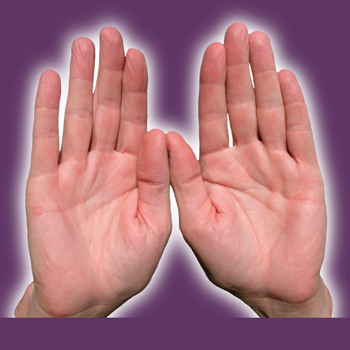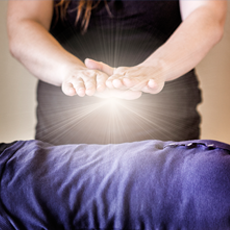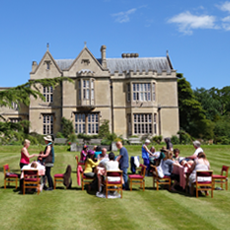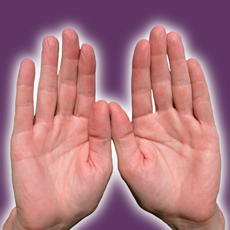by William Lee Rand
At hospitals and clinics across America, Reiki is beginning to gain acceptance as a meaningful and cost-effective way to improve patient care. Personal interviews conducted with medical professionals corroborate this view.(1) "Reiki sessions cause patients to heal faster with less pain," says Marilyn Vega, RN, a private-duty nurse at the Manhattan Eye, Ear and Throat Hospital in New York. [Reiki] accelerates recovery from surgery, improves mental attitude and reduces the negative effects of medication and other medical procedures.
Vega, a Reiki master, includes Reiki with her regular nursing procedures. Because the patients like Reiki, she has attracted a lot of attention from other patients through word of mouth, as well as from members of the hospital staff. Patients have asked her to do Reiki on them in the operating and recovery rooms. She has also been asked to do Reiki sessions on cancer patients at Memorial Sloane Kettering Hospital, including patients with bone marrow transplants. Recognizing the value of Reiki in patient care, 6 doctors and 25 nurses have taken Reiki training with her.
America's Interest in Complementary Health Care
The general public is turning with ever-increasing interest to complementary health care, including Reiki. In fact, a study conducted by Dr. David M. Eisenberg of Boston's Beth Israel Hospital found that one in every three Americans has used such care, spending over 14 billion out-of-pocket dollars on alternative health care in 1990 alone!(2)
A survey conducted in 2007 indicates that in the previous year 1.2 million adults and 161,000 children in the U.S. received one or more energy healing sessions such as Reiki.(3)
Reiki is also gaining wider acceptance in the medical establishment. Hospitals are incorporating it into their roster of patient services, often with their own Reiki-trained physicians, nurses and support staff. Reiki was in use in hospital operating rooms as early as the mid-90's.(4) Since then its acceptance in medicine has grown. It is now listed in a nursing "scope and standards of practice" publication as an accepted form of care,(5) and a 2008 USA Today article reported that in 2007 15% of U.S. hospitals (over 800) offered Reiki as a regular part of patient services.(6) For a detailed description of 64 Reiki hospital programs, please go to www.centerforreikiresearch.org
Scientific Validation
A research study at Hartford Hospital in Hartford, Connecticut indicates that Reiki improved patient sleep by 86 percent, reduced pain by 78 percent, reduced nausea by 80 percent, and reduced anxiety during pregnancy by 94 percent.(7)
In 2009, The Center for Reiki Research completed the Touchstone Project, which summarized Reiki studies published in peer-reviewed journals. The 25 studies examined were further evaluated to determine the effectiveness of Reiki. The conclusion states: "Overall, based on the summaries of those studies that were rated according to scientific rigor as "Very Good" or "Excellent" by at least one reviewer and were not rated as weak by any reviewer, 83 percent show moderate to strong evidence in support of Reiki as a therapeutic modality."(8)
Why Hospitals Like Reiki
Hospitals are undergoing major changes. They are experiencing a need to reduce costs and at the same time improve patient care. Under the old medical model based on expensive medication and technology this posed an unsolvable dilemma. Not so with Reiki and other complementary modalities. Reiki requires no technology at all and many of its practitioners offer their services for free. Reiki is therefore a very good way to improve care while cutting costs.
Julie Motz, a Reiki trained healer has worked with Dr. Mehmet Oz, a noted cardiothoracic surgeon at Columbia Presbyterian Medical Center in New York. Motz uses Reiki and other subtle energy techniques to balance the patients' energy during operations. She has assisted Dr. Oz in the operating room during open heart surgeries and heart transplants. Motz reports that none of the 11 heart patients so treated experienced the usual postoperative depression, the bypass patients had no postoperative pain or leg weakness; and the transplant patients experienced no organ rejection.(9)
An article in the Marin Independent Journal follows Motz's work at the Marin General Hospital in Marin County, California, just north of San Francisco.(10) There Motz has used subtle energy healing techniques with patients in the operating room. She makes a point of communicating caring feelings and positive thoughts to the patients, and has been given grants to work with mastectomy patients in particular.
Dr. David Guillion, an oncologist at Marin General, has stated "I feel we need to do whatever is in our power to help the patient. We provide state of the art medicine in our office, but healing is a multidimensional process… I endorse the idea that there is a potential healing that can take place utilizing energy."
Reiki at Portsmouth Regional Hospital
Patricia Alandydy is an RN and a Reiki Master. She is the Assistant Director of Surgical Services at Portsmouth Regional Hospital in Portsmouth, New Hampshire. With the support of her Director Jocclyn King and CEO William Schuler, she has made Reiki services available to patients within the Surgical Services Department. This is one of the largest departments in the hospital and includes the operating room, Central Supply, the Post Anesthesia Care Unit, the Ambulatory Care Unit and the Fourth Floor where patients are admitted after surgery. During telephone interviews with pre-op patients, Reiki is offered along with many other services. If patients request it, Reiki is then incorporated into their admission the morning of surgery, and an additional 15-20 minute session is given prior to their transport to the operating room. Some Reiki has also been done in the operating room at Portsmouth Regional.
The Reiki sessions are given by 20 members of the hospital staff whom Patricia has trained in Reiki. These include RN's, physical therapists, technicians and medical records and support staff. Reiki services began in April 1997, and as of 2008 have given 8000 Reiki sessions.
"It has been an extremely rewarding experience," Alandydy says, "to see Reiki embraced by such a diverse group of people and spread so far and wide by word of mouth, in a positive light. Patients many times request a Reiki [session] based on the positive experience of one of their friends. It has also been very revealing to see how open-minded the older patient population is to try Reiki. In the hospital setting Reiki is presented as a technique which reduces stress and promotes relaxation, thereby enhancing the body's natural ability to heal itself."
The Reiki practitioners do not add psychic readings or other new-age techniques to the Reiki sessions, but just do straight Reiki. Because of these boundaries, and the positive results that have been demonstrated, Reiki has gained credibility with the physicians and other staff members. It is now being requested from other care areas of the hospital to treat anxiety, chronic pain, cancer and other conditions.
Alandydy, with her partner Greda Cocco, also manage a hospital-supported Reiki clinic through their business called Seacoast Complementary Care, Inc. The clinic is open two days a week and staffed by 50 trained Reiki volunteers, half of whom come from the hospital staff and the rest from the local Reiki community. They usually have 13-17 Reiki tables in use at the clinic with 1-2 Reiki volunteers per table. The clinic treats a wide range of conditions including HIV, pain, and side-effects from chemotherapy and radiation. Some patients are referred by hospital physicians and some come by word of mouth from the local community. They are charged a nominal fee of $10.00 per session. The clinic is full each night and often has a waiting list.
The California Pacific Medical Center's Reiki Program
The California Pacific Medical Center is one of the largest hospitals in northern California. Its Health and Healing Clinic, a branch of the Institute for Health and Healing, provides care for both acute and chronic illness using a wide range of complementary care including Reiki, Chinese medicine, hypnosis, biofeedback, acupuncture, homeopathy, herbal therapy, nutritional therapy and aromatherapy. The clinic has six treatment rooms and is currently staffed by two physicians, Dr. Mike Cantwell and Dr. Amy Saltzman. Cantwell, a pediatrician specializing in infectious diseases, is also a Reiki Master with training in nutritional therapy. Saltzman specializes in internal medicine and also has training in mindfulness meditation, acupuncture and nutritional therapy. Other professionals are waiting to join the staff, including several physicians.
The doctors at the clinic work with the patients and their referring physicians to determine what complementary modalities will be appropriate for the patient. A detailed questionnaire designed to provide a holistic overview of the patient's condition is used to help decide the course of treatment. The questionnaire involves a broad range of subjects including personal satisfaction with relationships, friends and family, with body image, and with job, career, and spirituality. The clinic is very popular and currently has a waiting list of more than 100 patients.
Dr. Cantwell provides 1-3 hour-long Reiki sessions, after which he assigns the patient to a Reiki II internist who continues to provide Reiki sessions outside the clinic. Patients who continue to respond well to the Reiki treatments are referred for Reiki training so they can continue Reiki self-treatments on a continuing basis.
Dr. Cantwell states: "I have found Reiki to be useful in the treatment of acute illnesses such as musculoskeletal injury/pain, headache, acute infections, and asthma. Reiki is also useful for patients with chronic illnesses, especially those associated with chronic pain."
At this point, Reiki is not covered by insurance at the clinic, but Dr. Cantwell is conducting clinical research in the hope of convincing insurance companies that complementary care is viable and will save them money.
More MD's and Nurses Practicing Reiki
Mary Lee Radka is a Reiki Master and an R.N. who has the job classification of Nurse-Healer because of her Reiki skills. She teaches Reiki classes to nurses and other hospital staff at the University of Michigan Hospital in Ann Arbor. She also uses Reiki with most of her patients. She has found Reiki to produce the best results in reducing pain and stress, improving circulation and eliminating nerve blocks.
Reiki master Nancy Eos, M.D., was a member of the teaching staff of the University of Michigan Medical School. As an emergency-room physician, she treated patients with Reiki along with standard medical procedures.
"I can't imagine practicing medicine without Reiki," Eos says. "With Reiki all I have to do is touch a person. Things happen that don't usually happen. Pain lessens in intensity. Rashes fade. Wheezing gives way to breathing clearly. Angry people begin to joke with me."
In her book Reiki and Medicine she includes descriptions of using Reiki to treat trauma, heart attack, respiratory problems, CPR, child abuse, allergic reactions and other emergency-room situations. Dr. Eos now maintains a family practice at Grass Lake Medical Center and is an admitting-room physician at Foote Hospital in Jackson, Michigan, where she continues to use Reiki in conjunction with standard medical procedures. According to Dr. Eos, there are at least 5 other physicians at Foote hospital who have Reiki training along with many nurses.(11)
Libby Barnett and Maggie Chambers are Reiki masters who have treated patients and given Reiki training to staff members in over a dozen New England hospitals. They teach Reiki as complementary care and the hospital staff they have trained add Reiki to the regular medical procedures they administer to their patients. Their book Reiki Energy Medicine describes their experiences.(12) One of the interesting things they recommend is creating hospital "Reiki Rooms," staffed by volunteers, where patients as well as hospital staff can come to receive Reiki treatments. Bettina Peyton, M.D., one of the physicians Libby and Maggie have trained states: "Reiki's utter simplicity, coupled with its potentially powerful effects, compels us to acknowledge the concept of a universal healing energy."
Anyone interested in bringing Reiki into hospitals is encouraged to do so. The hospital setting where there are so many people in real need is a wonderful place to offer Reiki. The experiences and recommendations in this article should provide a good starting point for developing Reiki programs in your area.
*Editors Note:It is very important when giving Reiki treatments in hospitals or otherwise to make sure the patient understands what Reiki is and to only provide a Reiki treatment if the patient has requested one. Also, if the issue comes up, it is important to explain that while Reiki is spiritual in nature, in that love and compassion are an important part of its practice, it is not a religion and that members of many religious groups including many Christians, Muslims, Hindus and Jews use Reiki and find it compatible with their religious beliefs.
1 The comments that follow were part of an interview I did with each person either in person or by telephone and were first published in my article, "Reiki In Hospitals," which appeared in the Winter 1997 issue of the Reiki Newsletter (precursor to Reiki News Magazine).
2 Eisenberg, David, et al. "Unconventional Medicine in the United States", New England Journal of Medicine 328, no. 4 (1993), 246-52.
2 Beth Ashley, "Healing hands", Marin Independent Journal, May 11, 1997.
3 P. M. Barnes, B. Bloom, and R. Nahin, CDC National Health Statistics Report #12. Complementary and Alternative Medicine Use Among Adults and Children, United States, 2007. (December 2008).
4 Chip Brown, "The Experiments of Dr. Oz,"The New York Times Magazine, July 30, 1995, 20-23.
5 American Holistic Nurses Association and American Nurses Association (2007), Holistic Nursing: Scope and Standards of Practice (Silver Spring, MD: Nursesbooks.org.)
6 L. Gill, "More hospitals offer alternative therapies for mind, body, spirit," USA Today, September 15, 2008 (Online) http://usatoday30.usatoday.com/news/health/2008-09-14-alternative-therapies_N.htm.
7 Hartford Hospital, Integrative Medicine, Outcomes, https://hartfordhospital.org/services/integrative-medicine/patient-support/outcomes. Measurements cited were obtained during the initial pilot phase of the study, December 1999 - December 2000.
8 The Center for Reiki Research, Touchstone Project, Conclusion, http://www.centerforreikiresearch.org.
9 Julie Motz, Hands of Life, Bantam Books, New York, 1998
10 Beth Ashley, "Healing hands", Marin Independent Journal, May 11, 1997.
11 Nancy Eos, M.D., Reiki and Medicine (Eos, 1995).
12 Libby Barnett and Maggie Chambers, with Susan Davidson, Reiki Energy Medicine, Healing Arts Press, Rochester, Vermont, 1996.







